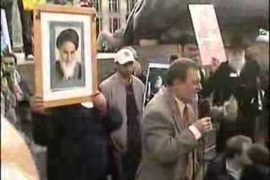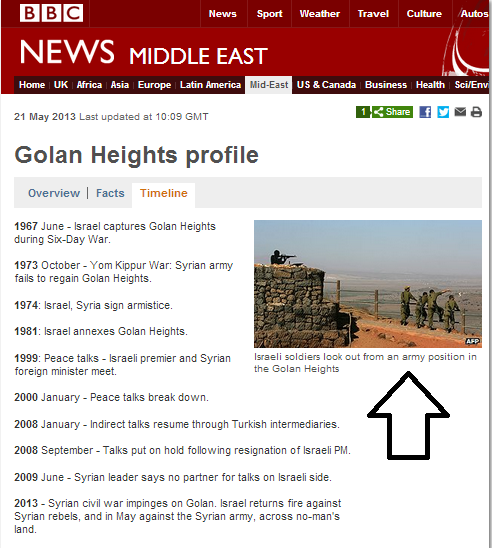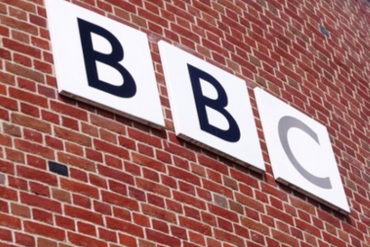The BBC Jerusalem Bureau’s Kevin Connolly continued his role as the corporation’s ‘chief Jerusalem explainer’ (see some previous instalments here, here, here, here and here) on November 28th with a report broadcast on BBC Radio 4’s ‘Today’ programme – available for a limited period of time from 02:39:22 here.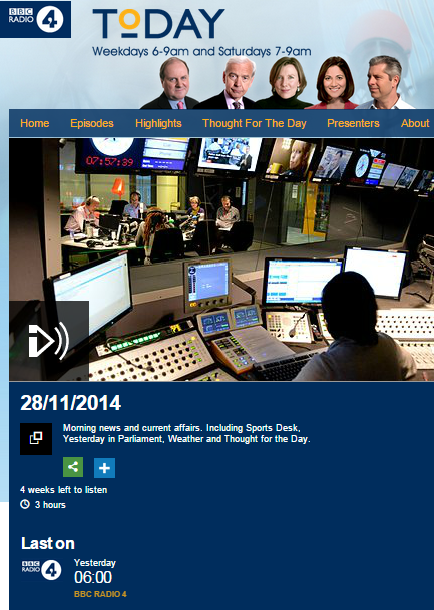
Presenter John Humphrys introduced the item as follows:
“If you’re a Muslim you will know it as al Haram al Sharif. If you’re Jewish you’ll call it Temple Mount. Home to the Al Aqsa Mosque and the Dome of the Rock, this holy site in the Old City of Jerusalem is the focus of rising tensions between the two communities: tensions that some see as indicative perhaps of a kind of third Infitad…Intifada uprising. From Jerusalem, our Middle East correspondent Kevin Connolly with this report.”
Kevin Connolly: “One by one, second by second, the mosques of East Jerusalem raise a call to prayer that hangs over the white stone skyline of this anxious, divided city. Somewhere in that plangent chorus is the call from the Al Aqsa Mosque which stands on ground sacred in Judaism and Islam alike, where Muslims have a monopoly of worship. Palestinians see a campaign by religious Jews for the right of worship to be extended to them in the context of a history of dispossession and defeat.”
Connolly fails to inform listeners that the Israeli authorities have stated on numerous occasions – including in interviews given to the BBC – that Israel has no intention of making any changes to that status quo. Audiences then hear interviewee Amir Heshin say:
“Today it’s a nuclear bomb. You just have to push the button and the whole Middle East will blow up.”
Connolly: “Amir Heshin is a former advisor on Arab affairs to the Mayor of Jerusalem. He says frustration has fuelled Palestinian fear and anger.”
Heshin: “On one side you have all these measures which are against and on the other side of the scale you have nothing. We are in the middle of the Intifada: Intifada which is based upon disappointment. They are sick of the Israeli attitude and they would like to change it.”
It would of course have been helpful to listeners trying to place Heshin’s words in their appropriate context had Connolly informed them that, in addition to indeed having been an advisor to former mayors of Jerusalem Teddy Kollek and Ehud Olmert, Heshin is also linked to an NGO called the Jerusalem Conflict Academic Centre which promotes a specific political approach to the issue of Jerusalem, including its division and the declaration of Temple Mount as an area of no sovereignty. Connolly continues:
“Not everyone is calling this a third Intifada but there are plenty of depressing straws in the wind. [sound of a detonation] That was the Israeli army blowing up the house of one of the Palestinians who’ve run over and killed hitch-hikers, tram passengers and pedestrians in recent months. It’s a form of punishment the state has revived in Jerusalem in recent weeks. But punishment is easier than prevention. [sound of a radio broadcast in Hebrew] Take this crime. At a railway station a young Palestinian stabs an equally young Israeli soldier.”
The incident Connolly describes occurred on November 10th and the terrorist did not just ‘stab’ his random victim Almog Shiloni – who, notably, remains unnamed in Connolly’s account – but killed him. Connolly continues:
“Suddenly the weapons are cars or knives – not guns or bombs – and the attacks appear spontaneous: the acts of individuals, not organisations. Israel’s intelligence services are struggling.”
Not for the first time we see the BBC erasing from audience view the fact that among the terrorists who perpetrated the attacks in recent weeks have been several members of known terrorist organisations, some of which have claimed responsibility for the attacks. Listeners then hear Connolly say:
“That young Palestinian was Nur Abu Hashem, a jobbing painter and decorator who often came from his home at Nablus in the occupied West Bank to work without papers in Israel.”
The terrorist is actually called Nur al-Din Abu Hashaya and his entry into Israel was illegal: a fact which Connolly’s euphemistic presentation does not make adequately clear. Neither does Connolly bother to inform listeners that Nablus (Schem) has been under the control of the Palestinian Authority for almost two decades – since December 12th 1995 – under the terms of the Oslo Accords. Listeners then hear a recording of the terrorist’s mother speaking in Arabic, with Connolly saying:
“Nur Abu Hashem’s mother, Salsan [phonetic] waits with resignation for the inevitable demolition of her home. But worse for her than that are the nagging questions about how her popular son – a forgiving boy, she says – could have done what he’s accused of.”
So, whilst the victim of a vicious terror attack remains unnamed and impersonalised, Connolly did find it editorially justifiable to present a humanizing cameo of the murderer and his family, at the same time erasing Hashaya’s Hamas affiliations from audience view.
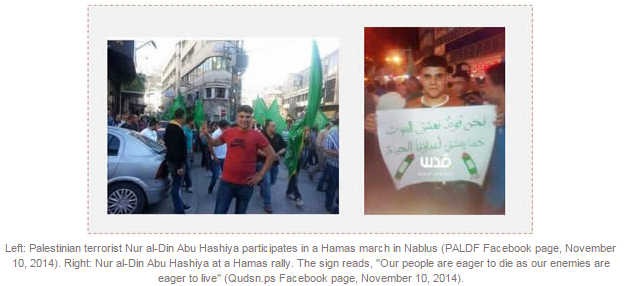
Connolly goes on:
“History focuses in Jerusalem like rays of sunlight concentrated through glass. This is the City of David archaeological site which lies between the Al Aqsa compound and the Arab suburb of Silwan; occupied by Israel in the war of 1967 and reserved in the eyes of the world for a future Palestinian state.”
Yet again we see BBC presentation of Silwan – Kfar Shiloach – without any mention of its Jewish history. Like the rest of the areas of Jerusalem which came under Israeli control after Jordan – despite an explicit warning from the Israeli prime minister – decided to attack Israel in the Six Day War, the status of Silwan is subject to final status negotiations under the terms of existing agreements signed by the representatives of the Palestinian people. Kevin Connolly, however, clearly has no time for such negotiations: he is already promoting the notion of a worldwide consensus opinion on the issue and in doing so, obviously misleads BBC audiences.
Connolly then goes on to promote a theme which has been popular with BBC correspondents in recent weeks: the notion that the legal purchase of existing property in certain neighbourhoods of Jerusalem turns people of a specific religion/ethnicity into “settlers” – and that despite the BBC’s own definition of ‘settlements’ being “residential areas built by the Israeli government”.
“Daniel Luria works for an organization that helps Jews to find property in the area. He calls them residents – not settlers – and says proximity to Temple Mount – as Jews call the Al Aqsa compound – is a selling point.”
After a brief contribution from Daniel Luria, Connolly closes:
“The recent upsurge in violence here has been sporadic, unpredictable. But this jaunty cartoon video circulating on Arabic social media sites warns Israelis, in Hebrew, to expect more. No-one knows what today or tomorrow might bring but non-one thinks this is over.”
So what did listeners to Radio 4 learn about the factors causing the latest surge in violence and terror in Israel from this item by Kevin Connolly? The campaign for equal rights of worship for non-Muslims on Temple Mount and the purchase of houses in Silwan by Jews are subjects which we have also seen previously promoted by the BBC in that context. Connolly’s narrative also includes portrayal of “frustration” and “disappointment” felt by Palestinians but the issues of incitement and glorification of terrorism by Palestinian officials and the role of terrorist organisations in turning those feelings into violent acts of terror were once again concealed from BBC audiences.

